
Help! is the fifth studio album by the English rock band the Beatles and the soundtrack to their film of the same name. It was released on 6 August 1965. Seven of the fourteen songs, including the singles "Help!" and "Ticket to Ride", appeared in the film and took up the first side of the vinyl album. The second side included "Yesterday", the most-covered song ever written. The album was met with favourable critical reviews and topped both the British and the US charts.

Revolver is the seventh studio album by the English rock band the Beatles. It was released on 5 August 1966, accompanied by the double A-side single "Eleanor Rigby" / "Yellow Submarine". The album was the Beatles' final recording project before their retirement as live performers and marked the group's most overt use of studio technology to date, building on the advances of their late 1965 release Rubber Soul. It has since become regarded as one of the greatest and most innovative albums in the history of popular music, with recognition centred on its range of musical styles, diverse sounds, and lyrical content.
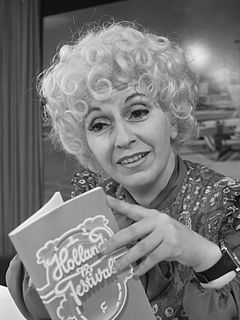
Catherine Anahid "Cathy" Berberian was an American mezzo-soprano and composer based in Italy. She interpreted contemporary avant-garde music composed, among others, by Luciano Berio, Bruno Maderna, John Cage, Henri Pousseur, Sylvano Bussotti, Darius Milhaud, Roman Haubenstock-Ramati, and Igor Stravinsky. She also interpreted works by Claudio Monteverdi, Heitor Villa-Lobos, Kurt Weill, Philipp Zu Eulenburg, arrangements of songs by The Beatles, and folk songs from several countries and cultures. As a composer, she wrote Stripsody (1966), in which she exploits her vocal technique using comic book sounds (onomatopoeia), and Morsicat(h)y (1969), a composition for the keyboard based on Morse code.
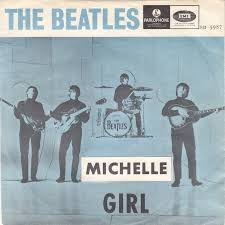
"Michelle" is a song by the English rock band the Beatles from their 1965 album Rubber Soul. It was composed principally by Paul McCartney, with the middle eight co-written with John Lennon. The song is a love ballad with part of its lyrics sung in French.
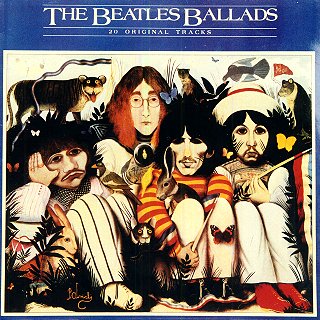
The Beatles Ballads is a compilation album featuring a selection of ballad songs by the English rock band the Beatles. The album was not released in the United States, but in Mexico, the United Kingdom, Canada, New Zealand, Germany, Italy, Spain, India, Japan, South Korea and Australia. In Australia, the album was a big success, spending seven weeks at number one. It reached number 17 in the UK.

"Ticket to Ride" is a song by the English rock group the Beatles, written by John Lennon and credited to Lennon–McCartney. Issued as a single in April 1965, it became the Beatles' seventh consecutive number 1 hit in the United Kingdom and their third consecutive number 1 hit in the United States, and similarly topped national charts in Canada, Australia and Ireland. The song was included on their 1965 album Help! Recorded at EMI Studios in London in February that year, the track marked a progression in the Beatles' work through the incorporation of drone and harder-sounding instrumentation relative to their previous releases. Among music critics, Ian MacDonald describes the song as "psychologically deeper than anything the Beatles had recorded before" and "extraordinary for its time".
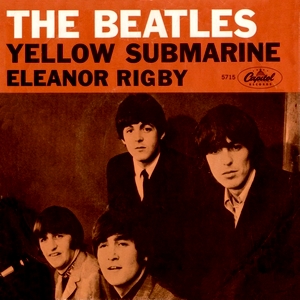
"Eleanor Rigby" is a song by the English rock band the Beatles from their 1966 album Revolver. It was also issued on a double A-side single, paired with "Yellow Submarine". The song was written primarily by Paul McCartney and credited to Lennon–McCartney.

"Yellow Submarine" is a song by the English rock band the Beatles from their 1966 album Revolver. It was also issued on a double A-side single, paired with "Eleanor Rigby". Written as a children's song by Paul McCartney and John Lennon, it was drummer Ringo Starr's vocal spot on the album. The single went to number one on charts in the United Kingdom and several other European countries, and in Australia, Canada and New Zealand. It won an Ivor Novello Award for the highest certified sales of any single written by a British songwriter and issued in the UK in 1966. In the US, the song peaked at number two on the Billboard Hot 100 chart.
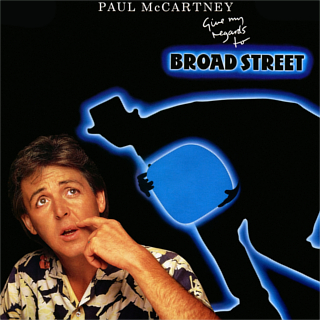
Give My Regards to Broad Street is the fifth solo studio album by Paul McCartney, as well as the soundtrack album to his 1984 film of the same name. The album reached number 1 on the UK chart. The lead single, "No More Lonely Nights", was BAFTA and Golden Globe Award nominated. It was also to be his final album to be released under Columbia Records, which had been his US label for over five years.
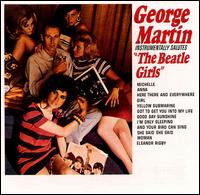
George Martin Instrumentally Salutes The Beatle Girls is a 1966 album by George Martin & His Orchestra. It is the third of a series of albums by Martin featuring instrumental arrangements of Beatle songs. The album was issued on CD by One Way Records.
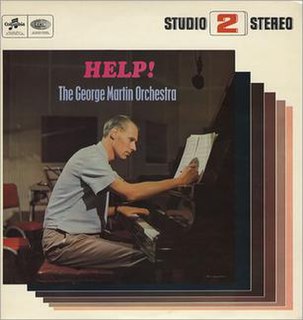
Help! is a 1965 album by the George Martin Orchestra, the second of a series of albums by Martin featuring instrumental arrangements of Beatle songs. This release focused on songs from their album Help! Unlike his other albums, the UK issue is not on Martin's Parlophone label, but on EMI's sister Columbia Graphophone's Studio 2 Stereo series label.

Songs of the Beatles is a 1981 album by Sarah Vaughan of songs by The Beatles.
The Beatles Anthology is a documentary television series on the career of the Beatles. It was broadcast on UK television in six parts on ITV between 26 November and 31 December 1995, while in the United States it was seen as three feature-length episodes on ABC between 19 and 23 November 1995. It was released in greatly expanded form as an eight-volume VHS set and an eight-disc Laserdisc set on 5 September 1996. The series was re-released on DVD in 2003, with an 81-minute special-features disc.
The Beatles Concerto is an instrumental musical medley of tunes from songs by The Beatles, arranged and composed by John Rutter within a classical "Piano Concerto Form".

The Paul McCartney World Tour was a worldwide concert tour by Paul McCartney, notable for being McCartney's first tour under his own name, and for the painted stage sets by artist Brian Clarke. The 103-gig tour, which ran from 1989 through 1990, included a concert played to what was then the largest stadium crowd in the history of rock and roll. It was McCartney's first major tour outing in ten years, since Wings UK Tour 1979, and his first world tour since the 1976 Wings Over the World Tour.

The Beatles Box is an eight-record box set of Beatles recordings, initially released on 3 November 1980 by World Records, a mail-order subsidiary of EMI. It was also issued in two formats by Reader's Digest in New Zealand, Australia and Mexico.
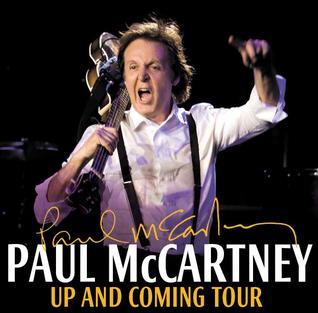
The Up and Coming Tour was a concert tour by Paul McCartney. The tour began on 28 March 2010, at the Jobing.com Arena in Glendale, Arizona, included two concerts at the Hollywood Bowl in Los Angeles, following with concerts in Miami and San Juan, the latter marking McCartney's first concert in Puerto Rico as well as the first presence of a Beatles member.

The Driving World Tour was a concert tour by English musician Paul McCartney. It marked his first tour of the 21st century and of any kind since 1993's New World Tour. For the first time in nearly a decade, McCartney returned to the road following the death of first wife, Linda McCartney, the death of George Harrison, and 9/11. This was in promotion of his 2001 album Driving Rain. Paul "Wix" Wickens returned on keyboards and is credited as Musical Director. New to the fold were Americans Rusty Anderson, Brian Ray, and Abe Laboriel Jr. Paul McCartney's then-fiancée Heather Mills accompanied him on the tour and was in the audience for every American performance.

Basie on the Beatles is an album by pianist and bandleader Count Basie featuring performances recorded in late 1969 and released on the short-lived Happy Tiger label. It was Basie's second album of Beatles' compositions following 1966's Basie's Beatle Bag and featured liner notes by Ringo Starr.

One on One was a concert tour by English musician Paul McCartney that began on 13 April 2016 and traveled through the United States, Canada, Argentina, Germany, France, Spain, the Netherlands, the Czech Republic, Norway, Denmark, Belgium, Japan, Brazil, Mexico, Australia and New Zealand, ending on 16 December 2017. The tour marked McCartney's first-ever performances in Fresno, South Dakota, and Arkansas. Prior to the announcement of the tour, McCartney revealed two European festival dates for June 2016 at the Pinkpop Festival and Rock Werchter respectively. He described the title of the tour as "when I do the show, I feel like I'm kind of talking to someone like me in the audience, even though you're at the back of the hall, we try and bring the intimacy to you. It's me, one-on-one, with every member of the audience".

















